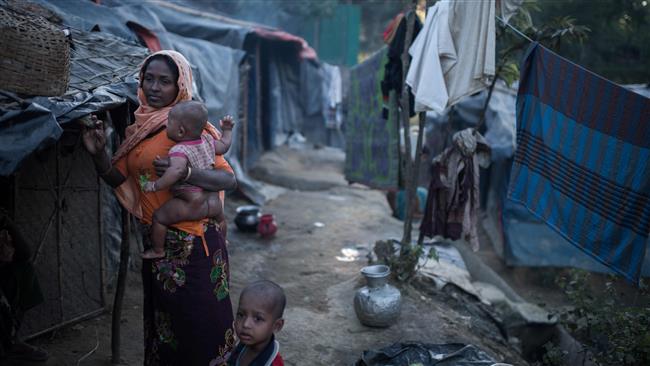Rohingya refugees must return to own homes, aid groups say
Aid groups from across the world have stressed that the Rohingya Muslim refugees returning to Myanmar from Bangladesh must be allowed to settle in their original homes.
More than a dozen humanitarian organizations, including Save the Children and Oxfam, said in a joint statement on Saturday that they were “concerned” by recent announcements that Myanmar would begin repatriating the persecuted Muslim community to the western Rakhine State in two months and initially shelter them in make-shift camps.
“There should be no form of closed camps or camp-like settlements. INGOs (International non-governmental organizations) will not operate in such camps if they are created,” the statement said, adding that all returns must be on a voluntary basis.
The statement came after announcement generated fears that the refugees would face the same violence endured before fleeing central Rakhine.

More than 600,000 Rohingya Muslims have sought sanctuary in Bangladesh after the military in the mostly-Buddhist Myanmar launched a crackdown in their villages across the northern parts of Rakhine State on August 25, using a number of armed attacks on security checkpoints as a pretext.
Myanmar’s officials use the term “Bengali” to refer to the Rohingya. The group, which has lived in Myanmar for decades, has been denied citizenship in both Myanmar and neighboring Bangladesh.
During the past three months, government troops, apart from raping, have been committing killings, making arbitrary arrests, and carrying out mass arson of houses in hundreds of predominantly-Rohingya villages in the restive state.

The United Nations has already described the Rohingya as the most persecuted community in the world, calling the situation in Rakhine similar to “a textbook example of ethnic cleansing.”
Rights groups say Myanmar’s treatment of the Rohingya constitutes crime against humanity.
Prominent human rights groups have recently called on international agencies to monitor the safe return of Rohingya Muslims to Myanmar, with estimates as to how many Muslims have been killed varying from 1,000 to 3,000.
'Israel booby-trapped walkie-talkies, pagers years before Lebanon blasts'
Gaza Health Ministry calls for urgent intl. help to protect hospitals amid Israeli genocide
Stakes involved in Iran’s partnership with Eurasian Union
VIDEO | Press TV's news headlines
Iran says ‘ready’ to reopen embassy in Syria, holds talks with Damascus
VIDEO | 12 people killed in ammunition factory blast in northwest Turkey
Iraq’s PMU masses resistance forces on border with Syria amid mounting concerns
Israel killed over 700 athletes in Gaza since October 2023










 This makes it easy to access the Press TV website
This makes it easy to access the Press TV website